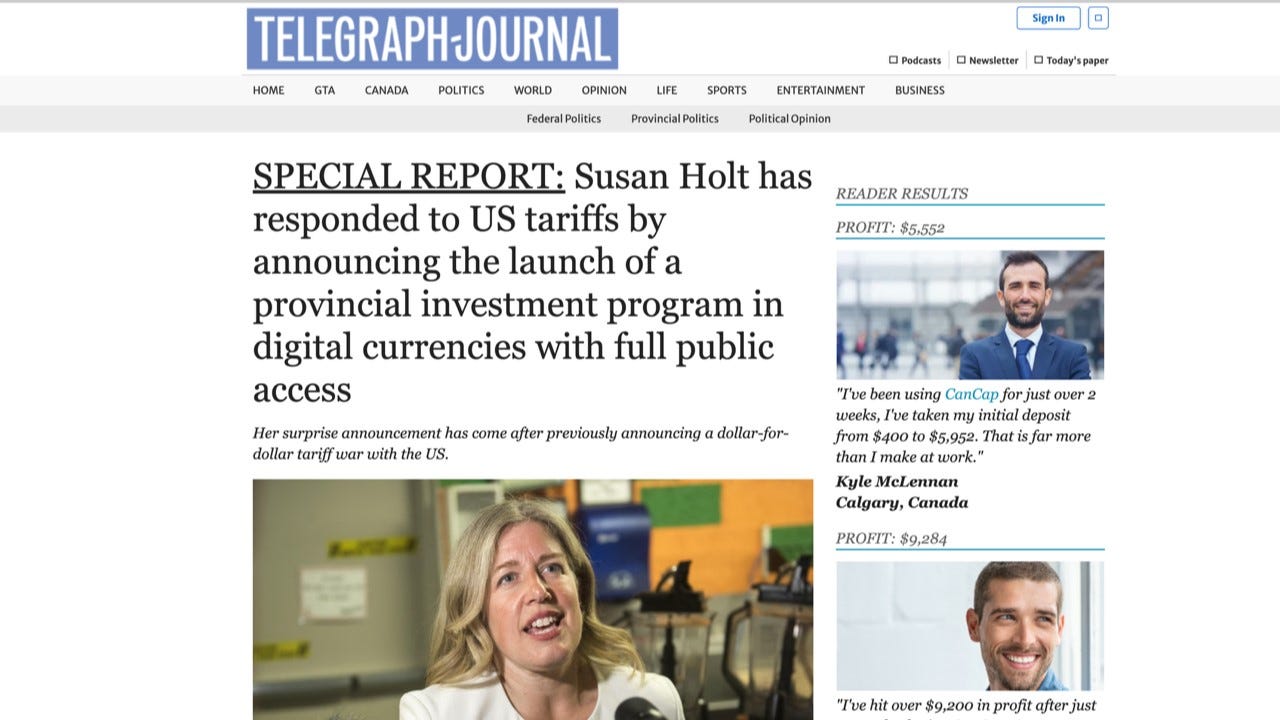Scammers use tariff news to lure victims
Scheme uses phony online news report depicting Premier Susan Holt touting crypto-currency as means to counter effects of trade war launched Tuesday by United States
Online scammers apparently waste no time in capitalizing on current events.
A fake news report online about New Brunswick’s premier touting a “provincial investment program” in digital currencies as a means to address the U.S. tariff threat is making the rounds, the Fredericton Independent has learned.
A website displaying the masthead of the Telegraph-Journal, New Brunswick’s provincial newspaper, as well as a bogus news report titled: “SPECIAL REPORT: Susan Holt has responded to US tariffs by announcing the launch of a provincial investment program in digital currencies with full public access.”

The website’s URL bears no resemblance to the newspaper’s online presence, nor its usual formatting. The Fredericton Independent is deliberately omitting the web address to avoid proliferating the scheme.
The website appears to promote something called “CanCap,” falsely touted as the Bank of Canada’s new digital currency.
The Financial and Consumer Services Commission of New Brunswick, the province’s watchdog agency overseeing financial services, confirmed Wednesday the article is fake and that the digital-currency scheme is a scam.
The link to the phony news website appears to be spreading mainly through Facebook.
“Holt has reportedly taken Trump by surprise with the move. The US president is said to be furious at having lost his bargaining power with Canada, with the Canadian government now having the upper hand with the launch of a new groundbreaking platform,” the bogus article stated.
“The program, called CanCap, is supported by the provincial government and backed by the Bank of Canada's new digital currency. The program is taking advantage of the boom in cryptocurrencies since Trump was announced as the next president and will allow Canadians to invest in digital currencies at zero risk.”
It also includes a doctored photo of Holt at the supposed “unveiling” of CanCap, and features a written segment falsely reporting on how Holt showed CBC’s Ian Hanomansing how to access the program by means of a smartphone app.
“Ian Hanomansing handed the premier his phone. She quickly signed up with his email and cell phone number, and waited for the platform's account manager to call within the next 60 seconds to get started,” a photo caption in the piece stated.
The commission, in a news release issued Wednesday, said there’s a growing trend of the use of technology, including generative AI, in such scams to personalize and target demographics.
“Most recently, a fake news article circulating on social media uses well-known Canadian and New Brunswick media outlets and high-profile individuals to encourage investing in cryptocurrency through the trading platform CanCap,” it said.
“CanCap is not registered to deal or advise in securities in New Brunswick and is not on the list of registered crypto-trading platforms.”
The commission pointed out, though, that the CanCap scam ought not be confused with the CanCap Group, a privately-owned and legitimate Canadian financial services company.
The bogus article’s claims that a new investing program is supported by the provincial government and backed by the Bank of Canada’s new digital currency are false.
Screenshots of bank statements purporting to show earnings from the platform are false as well, the agency said.
“The article claims that the goal of the program is to help New Brunswickers avoid losing any income in light of the tariffs,” the release said.
“Scammers often exploit current headlines to perpetrate their crimes, build trust and capitalize on heightened emotions. New Brunswickers should be aware that the platform being promoted in this fake news article is not related to any provincial tariff relief funding or support that is, or will be, made available.”
Anyone looking to avail themselves of relief programs should first verify them directly with the provincial government or seek genuine information about any available funding or relief from from government.

“The uncertainty that the U.S. tariffs place on our economy is causing some New Brunswickers increased anxiety and concern about their financial security, and they may be looking for other means of income,” Marissa Sollows, the commission’s director of communications and public affairs, said in the release.
“Scammers are taking advantage of the situation, preying on individuals when they are at their most vulnerable.”
While the New Brunswick RCMP didn’t comment on the CanCap scam specifically, it did warn about a proliferation of online fraud schemes.
“There are a variety of scams and frauds circulating in New Brunswick, by phone, email, and other means on the Internet,” RCMP spokesperson Cpl. Hans Ouellette wrote in an email to the Fredericton Independent on Wednesday.
He said it’s common for scammers to use the guise of agencies and businesses names to fool potential victims, noting they’ve posed as the Canada Revenue Agency, Canada Border Services Agency, Microsoft, major credit-card providers and banking institutions, loan companies and media outlets.
“Scam websites look real. They often copy the design, layout, and even the URL of trusted sites you visit every day,” Ouellette wrote.
“Their main goal is to collect your personal information such as credit-card details, social insurance number or other sensitive information. Sometimes, they might even try to install malware on your device or trick you into buying counterfeit products.”
Information on current scams and measures one can take to protect oneself can be found on the Canadian Anti-Fraud Centre's website.
Don MacPherson can be contacted at ftonindependent@gmail.com.




This scam has already used many Canadian politicians in their ads. All the same.
Thank you for reporting on this important issue.